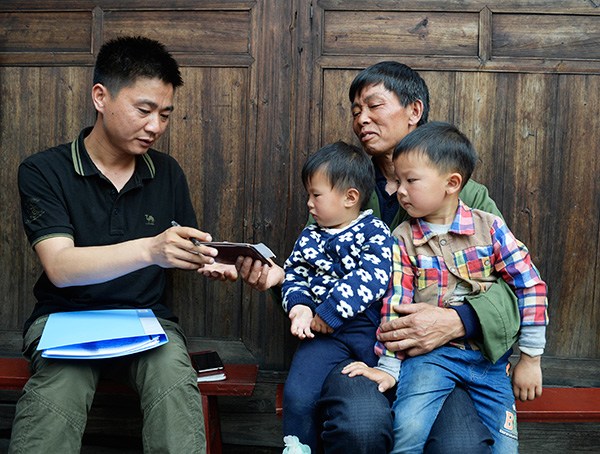
Song Minghong (left), a government employee in Huarong village, Hunan province, records information about Duan Zeben's grandsons for the country's first national survey of left-behind children. LIU JIE/XINHUA/ZHU WENBIAO/CHINA DAILY
Devastating effects
While China's economic development has been boosted by the influx of millions of rural migrant workers to the cities, the effects on the children they leave behind can be devastating.
"Children separated from their parents during their formative years face many problems in terms of education, security and mental health. Some left-behind children have even committed suicide or have been sexually abused. The problem should be seen as part of the wider problem of migrant workers in China," Guan said.
A national survey conducted last year by Shangxuelushang, an NGO that helps left-behind children, showed that about 15 percent reported having no physical contact with their parents during the course of a calendar year, and 4 percent received just one phone call a year from their parents.
More tragically, a number of incidents have attracted attention to their plight. Last year in Bijie, Guizhou province, four children of absent migrant workers committed suicide at home. They were ages 5 to 13.
Also last year, a 15-year-old girl and her 13-year-old brother were murdered at their home in Bijie, while their parents were working away from home. The police found that the girl had been sexually assaulted before she was killed.
'Is this my son?'
Fan decided to return home for good after speaking with her son via WeChat, a popular instant- and video-messaging service. She hadn't seen the boy for several months.
"I couldn't stop crying. I thought, 'Is this my son? Why does he look so different?' I missed him so much and I was in pain. I missed the precious moments of seeing him grow up," she recalled.
Because there was no internet connection in the family home, a social worker usually arranged a mutually suitable time with Fan and her mother, then the grandmother took the boy to the community center where mother and son could speak online.
Fan found a job in the Huarong community center, earning about 1,000 yuan ($150) a month, about one-third of her salary in Zhejiang, where she worked for the online shopping platform, Taobao. She has invited other migrant workers to join a chat group on WeChat where they share local employment news and encourage people to return to their homes.
Although money is much tighter now, Fan is far happier than before. "I am no longer tortured by the separation," she said.
Construction has now started on an industrial park in a town near Fan's village. Liu Xiaobing, the park's director, said the development aims to create 5,000 jobs. "We are trying to attract companies to open hubs. A Hong Kong-based cartoon company has chosen to locate their animation works here," he said.
However, not all parents have the courage or opportunity to return home, so local governments have trialed a number of innovative ways to support their children.
About 35 percent of the students at the Jiuxijiang primary school in Xupu, a township in Hunan, are left-behind children. In recognition of their plight, the school provides treats, such as lunch with the principal, and also holds birthday parties for them.
The school has also established a "left-behind children's home" as a center for special occasions, such as the monthly birthday parties. The center, which displays the children's school work and essays on its walls, also has telephones and audio-video equipment that allows the children to contact their parents.
In Chuandong, a township in Guizhou province, the local government has established a community center for left-behind children and has also encouraged a local vocational school to cooperate with the center.


















































